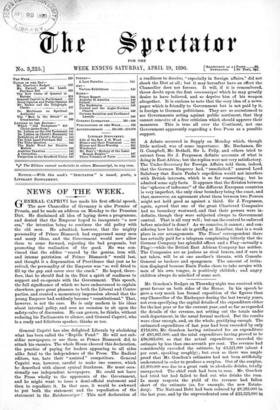• A debate occurred in Supply on Monday which, though
little noticed, was of some importance. Mr. Buchanan, Sir G. Campbell, Mr. Bethell, Sir L. Pelly, and others tried to extract from Sir J. Fergusson definite accounts of what is doing in East Africa; but the replies were not very satisfactory. The Under-Secretary for Foreign Affairs told them, indeed, that the German Emperor had, "unsolicited," assured Lord Salisbury that Emin Pasha's expedition would not interfere with British interests, which is so far reassuring ; but he admited some ugly facts. It appears that the division between the "spheres of influence" of the different European countries is very imperfect, the only clear boundary being the coast, and that, moreover, an agreement about them between two Powers might not hold good as against a third. Sir J. Fergusson, again, agreed that one of the great Chartered Companies had no boundary westward, and that their powers were in- definite, though they were subjected always to Government control. That is all very well ; but can the control be enforced before mischief is done ? As we conceive, it cannot ; and con- sidering how hot the air is gettitg at Zanzibar, that is a weak place in our arrangements. The Times' correspondent there has actually paid for a telegram complaining bitterly that the German Company has splendid offices and a Flag—actually a Flag !—while the British East African Company has neither. The Companies are as jealous as rival boxers, and if care is not taken, will be at one another's throats, with Consuls. Generalas backers and spongemen. The amount of irrita- tion displayed because Emin Pasha chose to take service with men of his own tongue, is positively childish ; ana angry children always do mischief of some sort.


















































